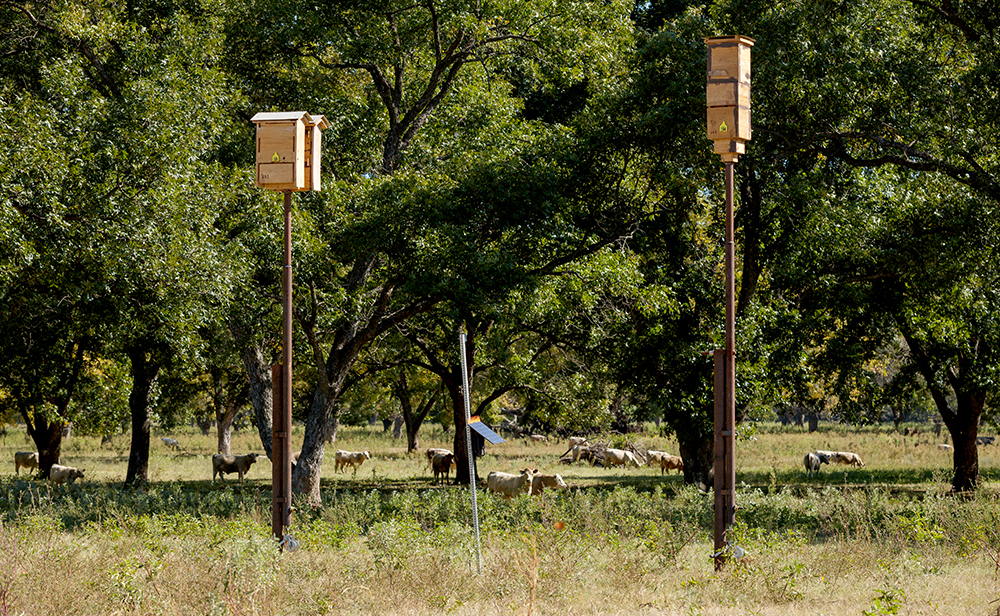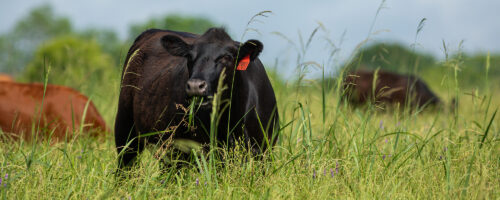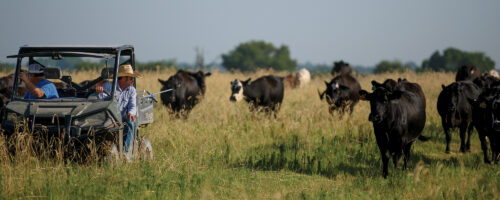Noble Research Institute Joins Forces with Merlin Tuttle’s Bat Conservation to Further Research on Bats for Land and Crop Management
Research will explore the intersection between natural bat habitats and bat-driven pest management in grazing animal and nut tree orchard environments
ARDMORE, Okla. (July 31, 2024) – Noble Research Institute (Noble) and Merlin Tuttle’s Bat Conservation (MTBC) have entered a collaboration to explore the role and ability of bats as an alternative pest management strategy in agriculture. From its work, the partnership will disseminate information and educational materials to equip farmers and ranchers with the ability to incorporate bats into their operations.
This new partnership complements Noble’s research into the impacts of soil health-building land management practices in farming and ranching operations and furthers MTBC’s mission to “inspire bat conservation worldwide.”
The collaboration will involve:
- Evaluating collected bat guano for economically damaging pest-DNA from bat populations serving grazing animal environments and nut tree orchard environments
- Evaluating placement locations, configurations and effectiveness of bat houses in or near grazing animal environments and nut tree orchard environments
- Comparing impacts of grazing animal environments and nut tree orchard environments that support active bat populations and like environments lacking active bat populations
- Exploring bat conservation methodologies and practices in or near grazing animal environments and nut tree orchard environments
- Developing producer-focused educational materials and instructional guides for bat management in or near grazing animal environments and nut tree orchard environments for positive impacts
- Identifying organizations and individuals to partner in this research and educational work
The growing conversation in agriculture surrounding bats’ role in supporting ecosystem services in farming and ranching operations has strengthened the need for further research. With the intention of building broader collaborations with universities and public and private partners, the organizations will identify whether bats can serve as a sustainable alternative to chemical pest control in pecan orchards and grazingland settings.
“We are excited about partnering with the Merlin Tuttle Bat Conservation team to further research on bats and, perhaps, clarify their important role in modern agriculture,” said Steve Rhines, president and CEO of Noble Research Institute. “The collaboration will provide key opportunities to explore the benefits of bats and their natural impact in working agricultural environments.”
This collaboration will expand Noble’s Pecan Research Strategy project, a six-year program launched in 2023. As part of a comprehensive assessment of orchard management practices and economic impacts, the study uses bat guano to identify specific bat species and their diet of economically impactful pecan pests. Examples of such pests include pecan nut casebearers, hickory shuckworms, and stinkbugs.

In Texas alone, the Brazilian free-tailed bat and other species are conservatively estimated to save farmers and ranchers $1.4 billion annually.

Bat boxes, which can hold approximately 200 individuals, have been installed at Noble’s Conrad-McMillan orchard and Red River Ranch orchard. Bat boxes are monitored for occupancy, and once occupied, bat guano is screened for species identification and the detection of pests in their diet. As part of the research project, additional testing using guano from established bat houses is also being conducted on producer properties in Seguin, Texas, Fentress, Texas, and New Braunfels, Texas.
“This partnership with Noble Research Institute will provide invaluable opportunities to expand both research and education, which is especially timely given bats’ precipitous decline and their increasingly documented roles in pest suppression,” said Merlin Tuttle, founder and executive director of Merlin Tuttle’s Bat Conservation.
To learn more about partnership opportunities to advance this important research, please visit www.noble.org/partner/ or merlintuttlesbatconservation.kindful.com/register/contact-form/.
About Merlin Tuttle’s Bat Conservation Merlin Tuttle’s Bat Conservation was founded in 2014 with the goal of protecting often misunderstood bats worldwide. Merlin’s more than 60-year legacy of experience in bat research, conservation, and photography is unsurpassed. MTBC relies on a powerful combination of science, field knowledge, and photography, to help save millions of bats; while protecting public health, economies, and ecosystems worldwide by teaching people to live harmoniously with bats through Merlin’s one-of-a-kind experience. Learn more at merlintuttle.org.
About Noble Research Institute
Noble Research Institute is the nation’s largest nonprofit dedicated to farm and ranch management and has been a leading, trusted resource in agriculture since 1945. The organization serves agricultural producers with education, research and consultation on regenerating soil health to improve their land, livestock and livelihood. Demonstrating its ongoing commitment to restoring U.S. grazing lands, Noble actively manages 13,500 acres of working ranchlands to provide real-world insights and applications for farmers and ranchers.
For more information about Noble Research Institute, visit www.noble.org.
For media inquiries about Noble Research Institute, please contact:
Kim Leaston | Sr. Public Relations Specialist | mailto:[email protected]


Comment